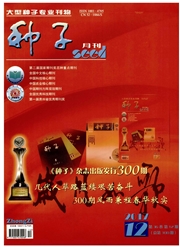

 中文摘要:
中文摘要:
对影响PCR反应的主要因子——模板DNA、引物、dNTPs和Mg^2+浓度进行优化,建立起适合于萝卜基因组DNA的RAID和IssR反应体系。RAPD反应体系(18μl)为随机引物0.4~0.6μmol/L,dNTPs0.15~0.2mmol/L,Mg^2+ 2.0mmol/L,模板DNA10~40ng,TaqDNA聚合酶0.8U;ISSR反应体系(16-)为引物0.5μmol/L,dNTPs 0.16mmol/L,Mg^2+ 2.5mmol/L,模板DNA10~40ng,TaqDNA聚合酶0.64U。对扩增程序中复性温度进行了梯度PCR试验,表明35~42℃(37℃)与52.4-58.3℃(55℃)分别适于萝卜基因组DNA的RAID.PCR和ISSR-PCR反应:应用优化的RAPD和ISSR反应体系对17个萝卜品种进行了鉴定分析。研究结果将为萝卜分子育种、品种鉴定与种子纯度检测提供重要的技术基础。
 英文摘要:
英文摘要:
The effect of different concentrations of template DNA, primer, dNTPs and Mg^2+ on the PCR reaction was analyzed and the optimized RAPD and ISSR-PCR systems in radish were established. The RAPD-PCR reaction was performed in a 18 L solution containing 0.4 - 0.6 umol/L of RAPD primer,0. 15 - 0.2 mmol/L of dNTPs,2.0 mmol/L of Mg^2+ ,genomic DNA 10 -40 ng and 0.8 U TaqDNA polymerase. The ISSR-PCR reaction was perfolmed in a 16 ul solution containing 0.5 umol/L of primer,0.16 mmol/L of dNTPs,2.5 mmol/L of Mg^2+ ,10-40 ng template DNA and 0.64 U TaqDNA polymerase. Gradient PCR experiment showed,The annealing temperature of 35 -42℃ (37℃)and 52.4 -58.3℃ (55 ℃ ) are suitable for BAPD and ISSRPCR in radish,respectively 17 radish caltivars were fingerprinted with the optimized systems.The systems would play an important role in molecular breeding,cultivar fingerprinting and seed purity testing in radish.
 同期刊论文项目
同期刊论文项目
 同项目期刊论文
同项目期刊论文
 Carbohydrate Content and Isozymes Changes during Fleshy Tap Root Formation and Thickening in Raphanu
Carbohydrate Content and Isozymes Changes during Fleshy Tap Root Formation and Thickening in Raphanu Cadmium accumulation and Antioxidant Enzyme Activities in response to Cadmium stress in radish (Raph
Cadmium accumulation and Antioxidant Enzyme Activities in response to Cadmium stress in radish (Raph DNA fingerprinting and genetic diversity analysis of late-bolting radish cultivars with RAPD, ISSR a
DNA fingerprinting and genetic diversity analysis of late-bolting radish cultivars with RAPD, ISSR a Cadmium uptake character and stress effect on the growth and antioxidant enzymes activities in Rapha
Cadmium uptake character and stress effect on the growth and antioxidant enzymes activities in Rapha 期刊信息
期刊信息
